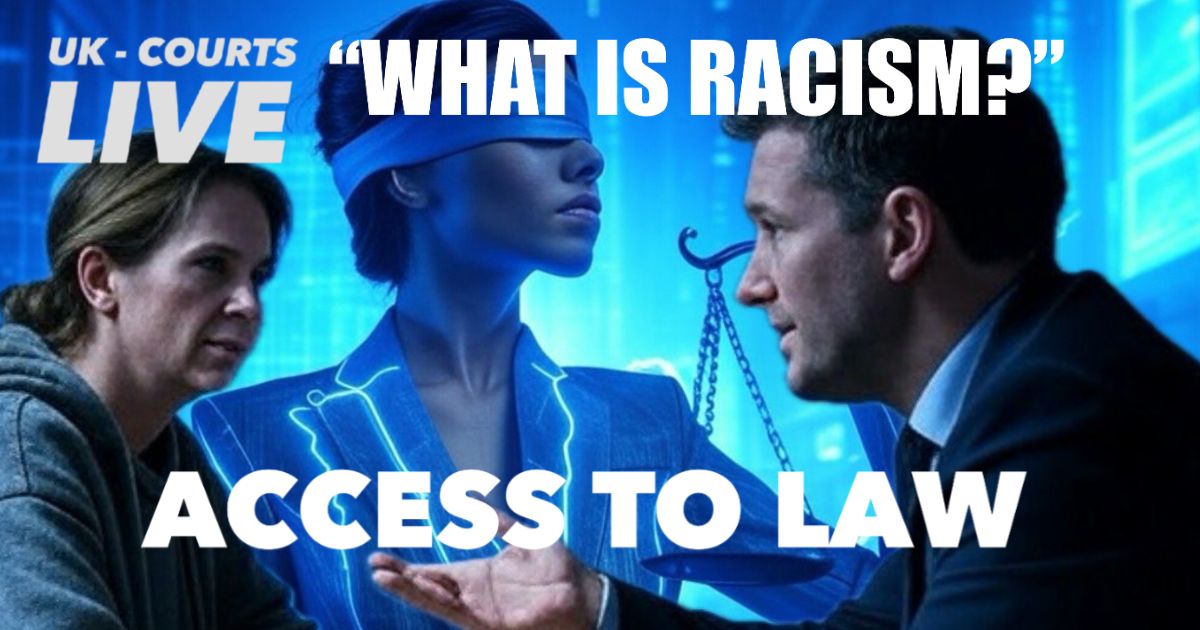🔴 UK RACISM LAW: Nationality Counts as Race in Court
UK law shock: Racism legally covers nationality as well as race — meaning insults like “Foreigner or even immigrant” can land you in court with a harsher sentence:
In Britain, people pride themselves on knowing their rights. Or at least, they think they do. Ask most people in the pub, on the train, or indeed outside the Crown Court, what “Racism” means, and they will give you a confident answer.
The Dictionary Definition, they will tell you, is straightforward: racism is prejudice or discrimination based on a person’s race. And to most, that means skin colour, or perhaps a broad ethnic background. But here’s the problem: in the law of England and Wales, that is not the definition.
The actual definition is quietly tucked away in the Equality Act 2010, the statute that now governs the majority of discrimination law. Section 9 of that Act defines “race” as including not just colour, ethnic or national origins, but also nationality.
To translate that out of legalese: in court, calling someone a “foreigner” or abusing them for being Polish, Irish, Romanian, or indeed French, is legally the same as racial abuse.
You may disagree with that proposition. You may think it stretches the term “racism” beyond its proper bounds. You may even mutter that the Oxford English Dictionary might want a word with Parliament. But whether you like it or not, this is what the black-letter law says.
This is not new. The old Race Relations Act 1976 said much the same thing, and courts have reinforced it repeatedly. In practice, it means that if someone hurls abuse in the street based on another person’s nationality, the charge sheet will not say “xenophobic insult” or “anti-foreigner slur.
It will say “Racially aggravated offence.” Judges, barristers, and juries apply this definition daily, even as most of the country goes on blithely unaware that “race” in law extends to “nationality.”
That brings us neatly to one of the great misunderstandings in modern criminal reporting. Every week, cases come before the magistrates and the Crown Court in which defendants are charged with racially aggravated assault, racially aggravated public order, or racially aggravated harassment.
Journalists, campaigners, and ordinary citizens alike tend to assume that this must mean the offence was about skin colour or ethnicity. Yet in many of these cases, the entire aggravating factor was that the victim happened to be from another country. Legally, the two are one and the same.
Before anyone leaps to conclusions, let us be clear. As court reporters and legal correspondents, our task is not to cheerlead for Parliament’s drafting choices, nor to offer our personal view on whether the law is wise or foolish.
Our task is simply to point out the facts. And the fact is that, in British law, racism is a broader concept than most people think. It is not just about race as the man in the street might define it, but also about nationality, national origin, and colour.
This has significant implications. For the defendant, it means the risk of a harsher sentence, since racially aggravated offences carry higher penalties. For the victim, it means an incident which might otherwise be treated as a run-of-the-mill assault or public order matter is elevated to a hate crime. And for society at large, it means that the headline word “Racist” is being applied in the courts to behaviour that, in common speech, many would call something else entirely.
All of which sets the stage for our next exploration. Because once we have given the full legal explanation, the more interesting point emerges: several prosecutions over the last few years would not have existed at all, or have been classified as much lesser offences, if the law had stuck to the dictionary definition of racism. And it is to those cases that we will now turn.
Consider for a moment the man jailed at Westminster Magistrates’ Court for drunkenly abusing two women on a night bus, his crime elevated not by the volume of his shouting or the sloppiness of his lager-laden tirade, but by the fact that he chose to call them “foreign.”
Without the statutory definition of race including nationality, the file before the judge would have shown a standard Section 4A Public Order Act offence and little else. With the definition, it was racially aggravated harassment, and he left court in handcuffs rather than with a fine.
Then there was the Crown Court defendant in Manchester who punched a doorman while shouting about his Polish origins. Had Parliament stuck with the dictionary, the charge sheet would have read simply “assault.”
Instead it became racially aggravated actual bodily harm, the sentencing guidelines ratcheted up, and prison time duly followed. The law did not ask whether the insult was about colour or culture. It asked whether it was about nationality. That was enough.
Which brings us to the more recent and headline-grabbing case of Lucy Connolly. The woman whose name has ricocheted around social media and tabloid front pages for the better part of a year, the woman who sent a tweet that would almost certainly not have seen her jailed had the law relied solely on the dictionary.
Connolly’s post did not reference colour. It did not reference ethnicity. What it did was take aim at nationality. And under Section 9 of the Equality Act, that was sufficient to render it racially aggravated.
Here is the point her defenders seem to miss. You can spend all the hours of the day howling about freedom of speech, about over-zealous prosecutors, about the courts stamping too hard on Twitter bluster.
But none of that changes the cold legal fact. The single reason Connolly’s case crossed the line into a criminal conviction with custody was because the definition of race in UK law includes nationality. Without that definition, she might never have stood in the dock. Without that definition, she might never have been sentenced. Without that definition, the cell door would not have closed behind her.
Ignorance of the law, as every judge enjoys reminding defendants, is no defence. If campaigners are genuinely angry about what happened to Lucy Connolly, they are shouting at the wrong target. The prosecution was lawful. The judge was bound, by the statutory sentencing guidelines.
The statute was clear. The real issue is not with the courts but with Parliament’s choice of wording. It is the statute book, not the sentencing remarks, that people should be marching against.
Until that changes, every person who fires off a casual insult tweet about someone’s nationality is playing with the full weight of a racially aggravated conviction. And sooner or later, another one will fall foul of the same line, because the line is already drawn.
So here is where we land. In Britain, the word racism does not mean what most people think it means. It does not mean only skin colour, or ethnicity, or the categories you might find on the back page of a census form
It means nationality as well, because Parliament wrote it that way and judges apply it that way. You might dislike it. You might say it dilutes the meaning of racism.
You might think it absurd that calling someone a “foreigner” in the street carries the same legal aggravation as abusing their race. But this is not an argument with the Oxford English Dictionary. This is the law of the land.
The effect is clear. Cases that would otherwise be charged as simple assaults or routine public order offences instead become racially aggravated. The sentencing tariff climbs.
Custody becomes more likely. And defendants who thought they were being clever with their choice of insult end up discovering that “ignorance is no defence” is more than just a courtroom cliché.
This matters not just for defendants but for campaigners and commentators. If you want to stop people going to prison for nationality-based remarks, stop shouting at judges and start lobbying Parliament. Until the definition changes, the law will continue to treat nationality as race, and the courts will continue to convict accordingly.
The real takeaway is brutally simple. If you want to avoid prison, don’t abuse someone for their nationality. If you want the law changed, don’t argue with reporters, prosecutors, or magistrates.
Argue with MPs. Because the law is what it is, not what you wish it to be. And the sooner people understand that, the fewer surprised defendants we will see standing in the dock insisting they had no idea.
Well, that’s all for now. But until our next article, please stay tuned, stay informed, but most of all stay safe, and I’ll see you then.





